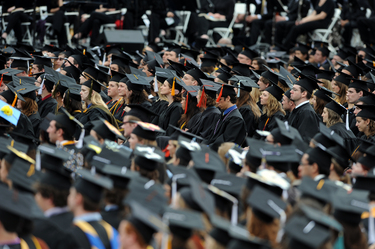Public prayer - when is it okay? You be the judge on this one

More than 8,500 graduates filled Michigan Stadium to hear President Barack Obama deliver the keynote address for their commencement ceremony on May 1.
Lon Horwedel | AnnArbor.com
“God of the Free, Hope of the Brave:
“For the legacy of America where diversity is celebrated and the rights of minorities are protected, we thank You. May these young men and women grow up to enrich it.
“For the liberty of America, we thank You. May these new graduates grow up to guard it.
“The political process of America in which all its citizens may participate, for its court system where all can seek justice, we thank You. May those we honor here this morning always turn to it in trust.
“The destiny of America, we thank You. May the graduates of Nathan Bishop Middle School so live that they might help to share it.
“May our aspirations for our country and for these young people, who are our hope for the future, be richly fulfilled. Amen.”
This invocation was delivered by Rabbi Leslie Gutterman a number of years ago at a public junior high school in Rhode Island. When the father of one of the students learned that the rabbi would be delivering an invocation and benediction, he asked for an injunction. The local federal court demurred, saying it didn’t have enough time to assess the situation.
Learn what the U.S. Supreme court decided and join the conversation at Our Values.org.


Comments
W. Vida
Thu, May 13, 2010 : 7:07 p.m.
Thanks for this series, I have found it very interesting. Here are my thoughts: The State has no right to tell the Church when she can pray. It is interesting that the court's decision as represented on the link you provided argued that state institutions do not have the right to "force people to pray". I would agree with that. But I don't think that is what was going on in public prayer. I think that people watching a prayer can either join in... or not. To me, it seems the only 'forcing' takes place when the State attempts to force people to stay quiet in certain situations. I posted more thoughts on this subject here; http://religionannarbor.wordpress.com/2010/05/13/state-church-and-the-bible/